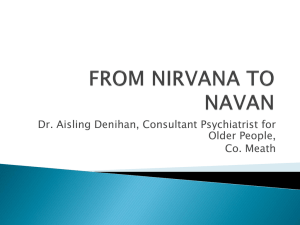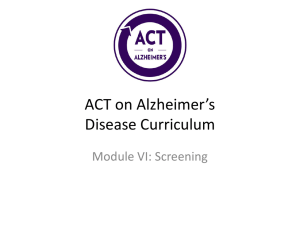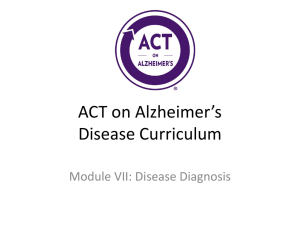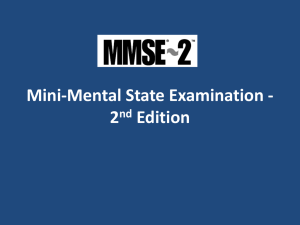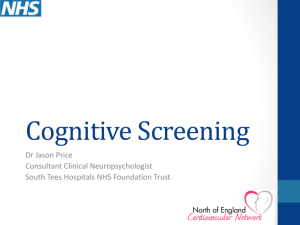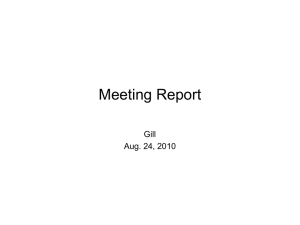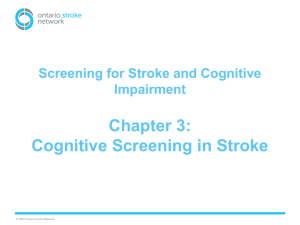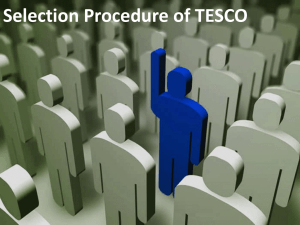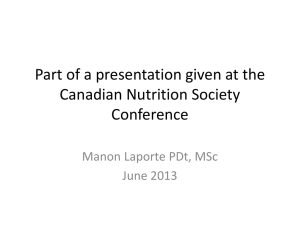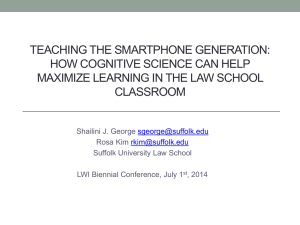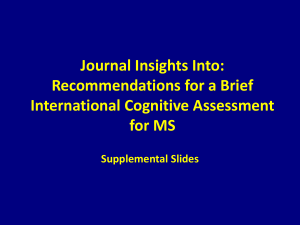Slides - ACT on Alzheimer`s
advertisement
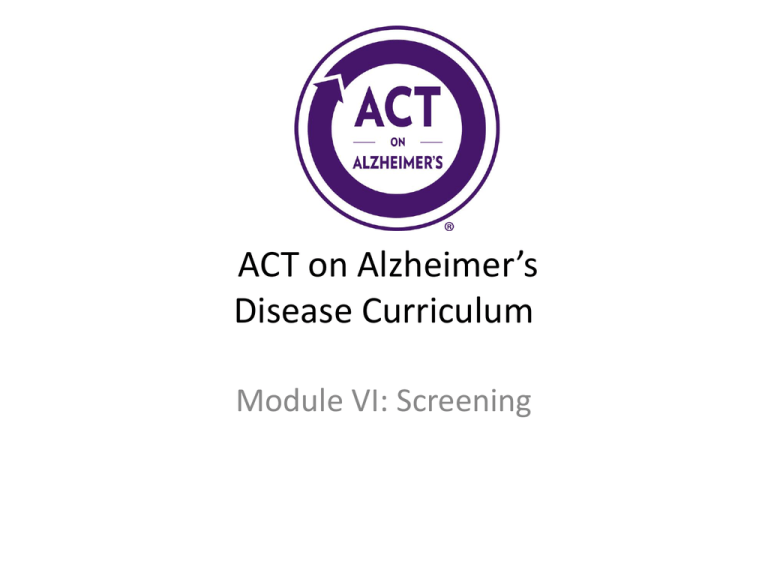
ACT on Alzheimer’s Disease Curriculum Module VI: Screening Screening • These slides are based on the Module VI: Screening text • Please refer to the text for all citations, references and acknowledgments 2 Module VI: Learning Objectives Upon completion of this module the student should: •Gain insight into the topic of screening including: tips, screening measures, and recommendations. •Summarize screening measures used for assessing cognitive functioning. Screening Screening Considerations • There are multiple cognitive assessment tools available to healthcare providers to aid in the diagnosis of dementia and Alzheimer’s disease • The clinical context should impact the decision on which cognitive assessment tool to use • A clinic also needs to decide which healthcare provider should administer the test • A pathway for intervention should be established for any patient who screens positive Screening Tips • There are a number of steps one can take to more effectively administer a cognitive assessment test – Maintain a laid back demeanor – Clearly explain the test – Encourage individuals to do their best – Provide support, especially if the patient is struggling Screening Tips • The following list are actions a tester should avoid: – Do not allow the patient to give up prematurely – Do not deviate from the standard instructions – Do not offer multiple choice answers – Do not bias score by coaching – Do not be soft on scoring Screening Measures • Wide range of options – Mini-Cog – Mini-Mental State Exam (MMSE) – St. Louis University Mental Status Exam (SLUMS) – Montreal Cognitive Assessment (MoCA) – Kokmen Test of Mental Status Mini-Cog • Mini-Cog is a five point cognitive screen – 3 word verbal recall – Clock draw • Takes 1.5 to 3 minutes • Short administration time makes it ideal for rushed primary care settings Mini-Cog • Pros Takes only 1.5-3 minutes to administer Clock drawing sensitive to both visuospatial & executive dysfunction Simple scoring and interpretation • Cons Not considered as sensitive for MCI or early dementia when compared to longer screens Brevity means less information to interpret Mini-Cog • Performance unaffected by education or language • Borson Int J Geriatr Psychiatry 2000 • Sensitivity and Specificity similar to MMSE (76% vs. 79%; 89% vs. 88%) • Borson JAGS 2003 • Does not disrupt workflow and increases rate of diagnosis in primary care • Borson JGIM 2007 • Failure associated with inability to fill pillbox • Anderson et al Am Soc Consult Pharmacists 2008 Mini-Cog • Borson and colleagues administered MC to 524 patients ≥65 in primary care setting – Screening did not disrupt clinic flow – 18% screen failure rate (MC score<4) – Only 17% of providers took appropriate action with screen fails » Borson et al. J. Gen. Intern. Med 2007 • McCarten and colleagues administered MC to 8,342 patients aged ≥70 in VA setting – Screen well-accepted by older veterans – Testing completed between 1-3 minutes – 25.8% failure rate among asymptomatic population » McCarten et al J Am Geriatr Soc MMSE • Mini Mental Status (MMSE) is one of the most widely used cognitive assessment tools • Test has a 30 point scale and tests orientation, memory, visuospatial, construction and language • Takes seven minutes to administer MMSE • Pros Widely accepted and validated tool for dementia screening 30-point scale well known and score is easily interpretable Measures orientation, working memory, recall, language, praxis • Cons Scale developed 40 years ago, before MCI criteria and when early dementia less well understood Lacks sensitivity to MCI and early dementia Takes 7 min. to administer Copyright issues SLUMS • The St. Louis University Mental Status Exam (SLUMS) was one of the first cognitive assessment tools to address MCI • Test has a 30 point scale • Takes 10 minutes to administer SLUMS • Pros More measures of executive functioning Good balance between easy and difficult items More sensitive than MMSE in detecting MCI and early dementia 30-point scale similar to MMSE Score range for MCI and dementia Free online • Cons Takes 10 min. to administer Slightly more complex directions than MMSE Less name recognition than MMSE MoCA • The Montreal Cognitive Assessment (MoCA) was developed at the Montreal Neurological Institute • MoCA is one of the most sensitive cognitive screens available • Takes 12-15 minutes to administer • Tests executive function in addition to language, visuospatial function and memory MoCA • Pros Much more sensitive than MMSE in detecting MCI and early dementia More content tapping higher level executive functioning 30-point scale similar to MMSE Translations available in 35+ languages Free online • Cons Takes 10-14 min. to administer More complex administration and directions than MMSE Kokmen Test of Mental Status • The Kokmen Test was developed at the Mayo Clinic • Has a 38 point scale • Takes longer than the MMSE to administer • More sensitive to MCI by including a longer word list for recall AD8 • 8 items questionnaire • Administered to an informant, such as a caregiver, rather than the patient • The cognitive domains include: orientation, executive functions, and interests in activities • If the result is abnormal a more thorough assessment is indicated Cognitive Assessment Tools Cognitive assessment Test Administration Time Scale (pts) MCI Sensitivity Dementia Sensitivity Dementia Specificity MiniCog 1-3 min 5 NA 76% 89% MMSE 7 min 30 18% 78% 88-100% SLUMS 10 min 30 92% 100% 81% MOCA 12 min 30 90% 100% 87% Recommendations for Cognitive Screening • It is recommended that geriatric patients 70 and older undergo an annual cognitive screen • Some advise the screening begin at age 65 • In busy primary care settings, the Mini-Cog can be used • Benefits of screening the asymptomatic geriatric population are currently being studied
